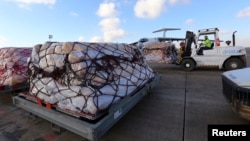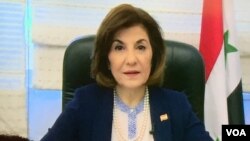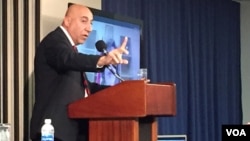A key adviser to Syrian President Bashar al-Assad rejected the need for urgent humanitarian aid for some besieged areas in Syria, while at the same time accusing the U.S. and its allies of keeping the country and the region mired in war.
"It's about time, please, that Western audiences be real, and look at our countries and see what we are suffering from," said Bouthaina Shaaban, a member of Assad's inner circle who was sanctioned by the U.S. Treasury Department in 2011.
"With every American intervention, with every Western intervention, with every terrorist intervention our countries are knocked 100 years back," she said.
Shaaban spoke Thursday — both in a prerecorded video and via Skype — during an event at the National Press Club in Washington sponsored by a mysterious two-year-old non-profit group called the Global Alliance for Terminating ISIS/Al-Qaeda (GAFTA).
GAFTA said its goal was to help bring together any and all parties interested in "terminating" the Islamic State terror group and al-Qaida. But Shaaban used much of her time to criticize the U.S. and its allies, going as far as to deride the West's humanitarian efforts, saying the Syrian people "have never been used to eat tinned food and macaroni."
Dining on 'wild berries'
Later, during the Skype question-and-answer session, Shaaban rejected concerns about Daraya, a town outside the capital that has been without food aid for four years.
"I am the one living here, and I can tell you Daraya is producing peas and beans and food and wild berries that is enough for the entire city," she said. "Nobody is starving."
A United Nations convoy carrying some medicine and other non-food supplies reached the town Wednesday, though some U.N. and U.S. officials fear it will not be nearly enough for the 4,000 civilians trapped in the area.
"Airdrops or no airdrops, trucks on the road, this is something that is being discussed between the U.N. and the Syrian government," Shaaban said.
"These are our people in Syria and we are trying our best with the U.N. representative here to try and find the best way to make all medicine, all food reach every single citizen," she added.
World not fooled
Assad's adviser saved some of her sharpest criticism for U.S. allies in the region. She accused Saudi Arabia, Turkey and Qatar of financing terrorists and working to sabotage the Cessation of Hostilities agreement. And she claimed Turkey has sent 8,000 terrorists across the border to destabilize Syria.
"There's no such thing as moderate opposition," Shaaban said.
At times, the question-and-answer session became confrontational with activists in attendance yelling at Shaaban, interrupting her as she tried to talk. At one point, organizers called for security.
The event was controversial even before Shaaban spoke, prompting questions about whether her participation on the panel violated existing U.S. sanctions.
A Treasury Department spokesperson declined to comment directly on the case, saying only, "Transactions with designated persons are generally prohibited."
Reached for comment Thursday, a U.S. State Department official dismissed Shaaban as "a propaganda mouthpiece for the Assad regime trying in vain to mask the suppression of the Syrian people and the regime's brutality."
"The world has not been fooled by her lies," the official said.
GAFTA's founder
GAFTA founder Ahmad Kubba, a real estate agent from Florida who fled Iraq in 1979, told VOA he was unaware of the sanctions. He said that he had been communicating with Shaaban via Skype, though he later told those in attendance at the National Press Club, "I don't know that much about her."
Kubba also denied his group was serving as a front for any other government or group, saying it did not take any donations and that the goal was simply to bring together all parties interested in "terminating" the Islamic State terror group and al-Qaida.
"When we invite a speaker, it does not mean we endorse them," Kubba said, likening Shaaban's Skype session to U.S. President Franklin Delano Roosevelt meeting with the Soviet Union's Joseph Stalin to fight Nazi Germany in World War II.
"You talk to the bad to knock down the worst," he said.
Yet several times during the event, the GAFTA founder came to Shaaban's defense, once even reversing himself in order to bolster her claims that all Islamic State fighters came not from Syria but from Turkey.
GAFTA members
Questions also remain about other key GAFTA members.
The group's vice president is Syrian-American Ghassan Mansour, whose brother, Sammy Mansour, was investigated by the U.S. government for a possible connection to a money-laundering scheme involving the Lebanese-based and Iranian-backed terror group Hezbollah.
Both Ghassan and Sammy Mansour denied they ever had any knowledge that Sammy Mansour's car-trading business received tainted money, and the government settled the case in 2012, acknowledging there was no intentional wrongdoing.
A 2014 GAFTA tax filing also lists Bassam al Hussaini as GAFTA's then-director.
Hussaini was introduced Thursday as the Iraqi government liaison with the country's Shia militias, and during his presentation said he was "sick and tired" of allegations the militias are controlled by Iran, a key Syrian ally.
"These are not Shia militias," Hussaini said. "These are Iraqis fighting to free the cities of Iraq."
The National Press Club issued a statement Thursday saying it was aware of the controversy surrounding the event and the participation of Assad adviser Shaaba. But it defended its decision to allow the event to take place.
"We have for decades also allowed private, third parties to book our facility for press conferences and other events," the statement said. "The National Press Club's answer to such controversial speakers is that we encourage our members and journalists everywhere to rigorously question her along with the other panelists."
VOA's Jamie Dettmer and VOA State Department Correspondent Pamela Dockins contributed to this report.






